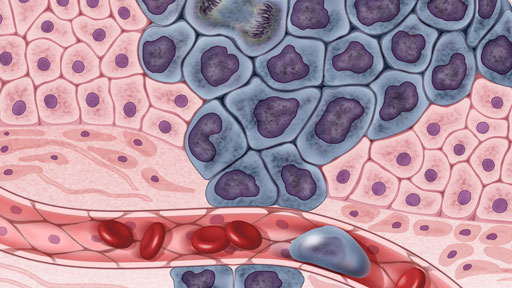WHAT: Investigators with The Cancer Genome Atlas (TCGA) Research Network identified new molecular subtypes that will help clinicians determine which tumors are more aggressive and which are more likely to respond to certain treatments. Their findings confirmed that PTCs are driven primarily by mutations in one of two cancer-associated genes: BRAF (and a particular mutation, V600E) or RAS. The work also detailed many differences between the two genetic types, particularly in signaling pathways that promote tumor development and growth.
The researchers developed a scoring system to reflect gene expression in the two PTC types, allowing them to characterize tumors and determine both the pathway a tumor uses to send signals and its relative aggressiveness. Where a tumor lies on a scale - called its thyroid differentiation score - can have important treatment implications because different tumor signaling properties can mean the cancer responds differently to particular therapies.
The study also showed that BRAF-driven tumors have a broader range of genetic complexity than previously thought, with distinct subtypes. The results suggest a need for a new classification system that more accurately reflects underlying genetic characteristics of the cancer. The researchers, led by Thomas Giordano, M.D., Ph.D., University of Michigan, Ann Arbor, and Gad Getz, Ph.D., Broad Institute of MIT and Harvard, Cambridge, Massachusetts, reported their results online October 23, 2014, in Cell.
Thyroid cancer is the fastest growing cancer in the United States, with more than 20,000 new PTC cases each year. Most thyroid cancers are slow-growing and treatable with surgery, hormone therapy and radioactive iodine. TCGA is a collaboration jointly supported and managed by the National Cancer Institute and the National Human Genome Research Institute, both parts of the National Institutes of Health.

ARTICLE: Giordano, et al. Integrated Genomic Characterization of Papillary Thyroid Carcinoma. Cell. DOI: 10.1016/j.cell.2014.09.050.
WHO: Carolyn Hutter, Ph.D., program director, Division of Genomic Medicine, NHGRI
NHGRI is one of the 27 institutes and centers at the National Institutes of Health. The NHGRI Extramural Research Program supports grants for research and training and career development at sites nationwide. Additional information about NHGRI can be found at http://www.genome.gov.
NCI leads the National Cancer Program and the NIH effort to dramatically reduce the burden of cancer and improve the lives of cancer patients and their families, through research into prevention and cancer biology, the development of new interventions, and the training and mentoring of new researchers. For more information about cancer, please visit the NCI website at http://www.cancer.gov or call NCI's Cancer Information Service at 1-800-4-CANCER (1-800-422-6237).
About the National Institutes of Health (NIH): NIH, the nation's medical research agency, includes 27 institutes and centers and is a component of the U.S. Department of Health and Human Services. NIH is the primary federal agency conducting and supporting basic, clinical, and translational medical research, and is investigating the causes, treatments, and cures for both common and rare diseases. For more information about NIH and its programs, visit http://www.nih.gov.




